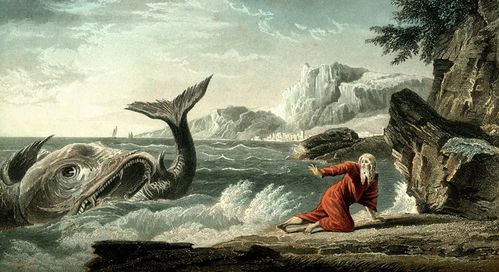Vomited Out of the Fish
ISAAC MCPHEE

VOMITED OUT
In our last blog post we looked at what Jonah’s experience in the fish would have meant to the original audience reading his story. The ancient Israelites reading Jonah’s story would have experience great hope that though they had been swallowed up by the nations, they weren’t doomed to die there. In this post we’ll look at the end of Jonah’s experience - being ‘vomited out’ on dry land.
Jonah chapter two ends with a verse that parallels the final verse of chapter 1. Where, after the episode with the storm and the sailors, “Yahweh appointed a great fish…” (1:17), after Jonah’s prayer, Yahweh completes His saving work, commanding the fish to “vomit” Jonah onto dry land.
With God’s hand clearly seen at work on either end of this episode, the second scene of this book has come full circle. The fish was an agent of God, serving His purpose and fulfilling its role dutifully. Both the swallowing and the vomiting came in God’s timing and by God’s will, which only reinforces Jonah’s earlier statement to the sailors that Yahweh was “The God of the heavens, who made the sea and the dry land” (1:9), controlling even the sea monsters.
Jonah chapter two ends with a verse that parallels the final verse of chapter 1. Where, after the episode with the storm and the sailors, “Yahweh appointed a great fish…” (1:17), after Jonah’s prayer, Yahweh completes His saving work, commanding the fish to “vomit” Jonah onto dry land.
With God’s hand clearly seen at work on either end of this episode, the second scene of this book has come full circle. The fish was an agent of God, serving His purpose and fulfilling its role dutifully. Both the swallowing and the vomiting came in God’s timing and by God’s will, which only reinforces Jonah’s earlier statement to the sailors that Yahweh was “The God of the heavens, who made the sea and the dry land” (1:9), controlling even the sea monsters.
While, for Jonah, to be “vomited out” was a sort of resurrection and salvation, this terminology had long been used as God’s ultimate threat against unfaithfulness.
Though the Hebrew word here (koh) occurs only eight times in the Old Testament, half of these uses occur in the book of Leviticus, where God speaks, first, of the Canaanites having been “vomited” out of the land because of their iniquity (Lev. 18:25), followed by a warning to Israel: “But you shall keep my statues and my rules and do none of these abominations, either the native or the stranger who sojourns among you (for the people of the land, who were before you, did all of these abominations, so that the land became unclean), lest the land vomit you out when you make it unclean, as it vomited out the nation that was before you” (Lev. 18:26-28).
But just as the “vomiting” of Jonah was actually a salvific act, bringing him, at last, out of the sea and onto the dry ground, so when God threatened to “vomit” Israel from the land due to their disobedience, the threat came coupled with a promise of salvation.
Israel, from a foreign nation, would be called to wake up from her spiritual slumber, and to remember Yahweh (Deut. 30:1). It was coupled with a call to turn back to God and be restored, “you and your children, and obey His voice in all that I command you today, with all your heart and with all your soul, then Yahweh your God will restore your fortunes and have mercy on you, and He will gather you again from all the people where Yahweh your God has scattered you… And Yahweh your God will bring you into the land that your fathers possessed, that you may possess it. And He will make you more prosperous and numerous than your fathers” (Deut. 30:2-5).
But just as the “vomiting” of Jonah was actually a salvific act, bringing him, at last, out of the sea and onto the dry ground, so when God threatened to “vomit” Israel from the land due to their disobedience, the threat came coupled with a promise of salvation.
Israel, from a foreign nation, would be called to wake up from her spiritual slumber, and to remember Yahweh (Deut. 30:1). It was coupled with a call to turn back to God and be restored, “you and your children, and obey His voice in all that I command you today, with all your heart and with all your soul, then Yahweh your God will restore your fortunes and have mercy on you, and He will gather you again from all the people where Yahweh your God has scattered you… And Yahweh your God will bring you into the land that your fathers possessed, that you may possess it. And He will make you more prosperous and numerous than your fathers” (Deut. 30:2-5).
Even in being “vomited out” there is hope, but it is a hope that will not come without great cost.
In Jonah’s case, as with Israel, the sin and the rebellion are not forgotten, despite Jonah’s renewed status as one saved by the mercy of God. The same call remains on both the man and the nation, and now they have the duty, once again, to turn to Yahweh and to obey. And it would not be any easier the second time.

Posted in Biblical Theology, Isaac McPhee, Jonah
Posted in Biblical Theology, Sermon Series, Isaac McPhee, Old Testament, Jonah
Posted in Biblical Theology, Sermon Series, Isaac McPhee, Old Testament, Jonah
